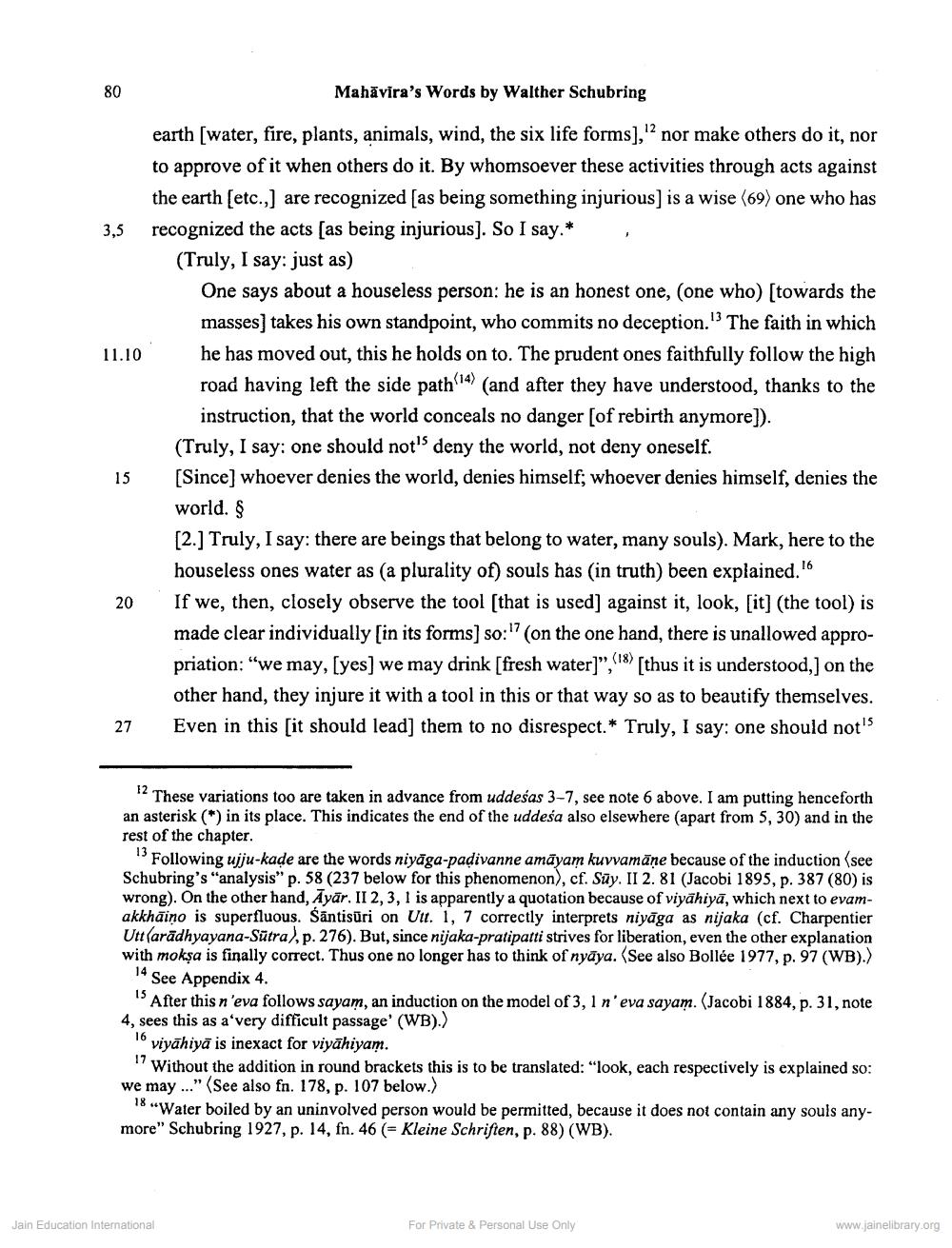________________
80
Mahāvira's Words by Walther Schubring
3,5
11.10
earth (water, fire, plants, animals, wind, the six life forms], nor make others do it, nor to approve of it when others do it. By whomsoever these activities through acts against the earth (etc.,) are recognized as being something injurious) is a wise (69) one who has recognized the acts as being injurious]. So I say.* (Truly, I say: just as)
One says about a houseless person: he is an honest one, (one who) [towards the masses) takes his own standpoint, who commits no deception." The faith in which he has moved out, this he holds on to. The prudent ones faithfully follow the high road having left the side path 14) (and after they have understood, thanks to the
instruction, that the world conceals no danger [of rebirth anymore]). (Truly, I say: one should not deny the world, not deny oneself. [Since] whoever denies the world, denies himself, whoever denies himself, denies the world. § [2.] Truly, I say: there are beings that belong to water, many souls). Mark, here to the houseless ones water as (a plurality of) souls has (in truth) been explained. 16 If we, then, closely observe the tool that is used) against it, look, [it] (the tool) is made clear individually [in its forms] so:"7 (on the one hand, there is unallowed appropriation; "we may, (yes) we may drink [fresh water]", 18) [thus it is understood,] on the other hand, they injure it with a tool in this or that way so as to beautify themselves. Even in this sit should lead] them to no disrespect.* Truly, I say: one should not's
15
20
27
12 These variations too are taken in advance from uddeśas 3-7, see note 6 above. I am putting henceforth an asterisk (*) in its place. This indicates the end of the uddesa also elsewhere (apart from 5,30) and in the rest of the chapter.
Following ujju-kade are the words niyāga-padivanne amāyam kuvvamāṇe because of the induction (see Schubring's "analysis" p. 58 (237 below for this phenomenon), cf. Sūy. II 2.81 (Jacobi 1895, p. 387 (80) is wrong). On the other hand, Ayār. II 2, 3, 1 is apparently a quotation because of viyahiyā, which next to evamakkhāino is superfluous. Säntisüri on Utt. 1, 7 correctly interprets niyāga as nijaka (cf. Charpentier Utt(arādhyayana-Sūtra), p. 276). But, since nijaka-pratipatti strives for liberation, even the other explanation with mokṣa is finally correct. Thus one no longer has to think of nyāya. (See also Bollée 1977, p. 97 (WB).) 14 See Appendix 4.
" After this n'eva follows sayam, an induction on the model of 3, 1 n'eva sayam. (Jacobi 1884, p. 31, note 4, sees this as a'very difficult passage' (WB).)
19 viyāniyā is inexact for viyāhiyam.
17 Without the addition in round brackets this is to be translated: "look, each respectively is explained so: we may ..." (See also fn. 178, p. 107 below.)
18 "Water boiled by an uninvolved person would be permitted, because it does not contain any souls anymore" Schubring 1927, p. 14, fn. 46 (= Kleine Schriften, p. 88) (WB).
Jain Education International
For Private & Personal Use Only
www.jainelibrary.org




